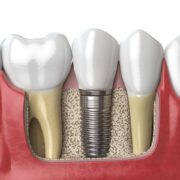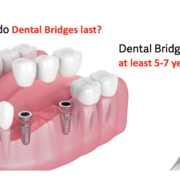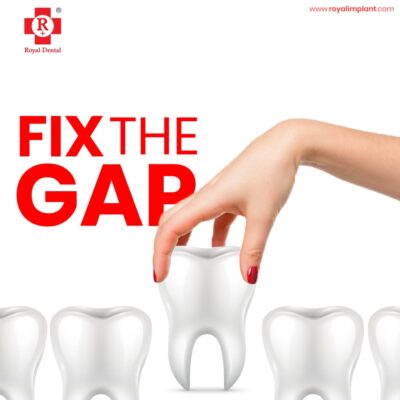Dental implants have evolved quite a bit in the last few decades for oral health. From being associated with “that metal thing” that only older people got to an aesthetic procedure that is almost as common as getting your teeth whitened, things have changed drastically for the better. With their popularity increasing and more research being conducted on them, it’s no wonder why dental implants are becoming one of the most favorable options in oral surgery. But while they are pretty good at preempting natural teeth and replacing them, not all implants work well for everyone. However, this is not to say that you shouldn’t consider them as an option. They are safe when placed by a qualified dentist. Here are reasons why dental implants might fail and what you can do about it.
Dental implants success is 95% in 5 years
There are umpteen reasons why dental implants fail. Some are due to the state of your health, others relate to the type of surgery performed, and still, others have to do with the materials used during the procedure. First, your oral health must be in good shape in order for implants to be effective. You should definitely get rid of any gum disease before putting them in your mouth. If the procedure wasn’t performed correctly, the implants could be damaged and therefore become ineffective.

Even if everything went according to plan, your health could still cause problems in the future. People with weaker immune systems are likely to have more trouble with their implants. Another reason why implants can fail is if you weren’t the right candidate for the procedure in the first place. For example, if you are very young, your gums are unlikely to heal properly from the surgery. Your oral health should be in tip-top shape before pursuing implants.
You might not be the right candidate
Not everyone is a suitable candidate for dental implants, which is something you should take into consideration before pursuing this route. If you have weak gums, are suffering from gum disease, or don’t have enough bone density in your mouth to properly support the implants, they might not work out in the long run. If you have any of these issues, it’s best to see a dentist and find out if they are the right option for you.
Your oral health is too poor
This shouldn’t come as a shocker because your oral health is directly linked to the health of your implants. If your gums are too weak and you have a poor blood supply to your jawbone, it’s unlikely that your implants will be stable in the long run. According to the International Institute of Biophysics, you should have no signs of gum disease, and your blood flow to the jaw bone should be at least 15% of that to your heart in order for dental implants to be viable.
Surgery might have involved complications
As with anything that is done by hand, there is a chance that the surgeon might make a mistake. In this case, the implant might not have been placed correctly and could fail to properly fuse with the surrounding bone. In the best-case scenario, the implant would need to be removed and placed again. Also the worst-case scenario, the implant would be so loose that it would need to be removed.

If your dentist or oral surgeon was inattentive during the procedure, the implant might be placed too deeply or shallowly. It could also be placed at an angle that would cause it to be loose and/or require removal. Even if the surgery was performed properly, the implant might not fuse with your jawbone properly, which is why monitoring the healing process is so important.
There may be an infection causing the implant to fail
This is another reason why dental implants fail. Infections are among the most common issues that can affect implants during and after the procedure. You should visit your dentist at least once a year and have your implants checked to make sure they are okay and that there isn’t any inflammation. You should also visit your dentist if you have reason to believe an infection is present.
Infections can come from many different sources. The dentist might have not cleaned the area thoroughly enough before and after the procedure. You might also have some bacteria in your mouth, which can travel to your implants. If you have no way of cleaning them regularly, the bacteria might spread to your implants and cause an infection.
Procedure was correct but choice was mistaken
The type of implant that you’re given depends on what is currently available in the market. Unfortunately, not all implants are created equal, and it’s possible that the one you received is subpar. The materials used in dental implants vary from brand to brand, and it’s possible that the one your dentist used isn’t as effective as it could be.

For example, it’s possible that your dentist used a material that contains traces of mercury. While mercury is undoubtedly toxic, it is sometimes used in dental implants. Unfortunately, mercury can cause a number of troublesome side effects, which is why many dentists have started to use a different type of material.
You’re not taking care of your dental implant properly
In order for your dental implant to succeed, you must take good care of it. Unfortunately, many people don’t take proper care of their implants, which can lead to infection, pain, and them failing completely. The best way to take care of your dental implant is to clean it regularly (at least once a day). First, you should brush your teeth before you go anywhere near your implants. This will help to remove any food particles that might otherwise get stuck in them. You should also use a soft-bristled toothbrush, as hard bristles can damage your implant.
Conclusion
If dental implants are something you are considering in order to replace missing teeth, it’s important to see a dentist first. Your dentist can assess your oral health and let you know if you are a suitable candidate for dental implants. It’s also important to keep in mind that dental implants are not a one-size-fits-all procedure. Your dentist will need to evaluate your oral health before performing the surgery and determine which type of implant would work best for you. With all that said, dental implants are one of the most effective and long-lasting procedures for replacing missing teeth. With proper care, they can last for many years.
Follow Us For More Updates





